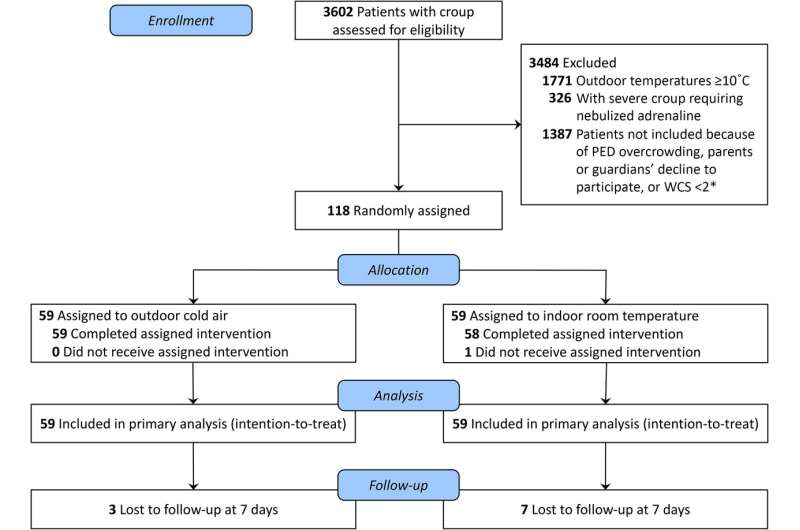This article has been reviewed according to Science X's editorial process and policies. Editors have highlighted the following attributes while ensuring the content's credibility:
fact-checked
peer-reviewed publication
reputable news agency
proofread
Could cold air help settle a case of croup? New study says yes

Pediatricians have suspected it for years, and now a new study may be proving them right: Cold air really can help ease children's croup symptoms.
Croup is a common childhood illness that usually starts as an ordinary cold. It arises when the infection causes swelling around the voice box (larynx) and wind pipe (trachea), leading to some distinctive croup symptoms: a cough that sounds like a seal's bark and a high-pitched "creaky" or whistling noise when a child inhales (what doctors call stridor).
Fortunately, most cases of croup are mild. And pediatricians have long told parents they can try some old-fashioned tricks for milder croup symptoms: running a hot shower and standing with their child in the steamy bathroom; standing in front of an open refrigerator freezer, or wrapping their child in blankets and going outside in the chilly air for a bit.
"The common denominator there is the moist air," said Dr. Mike Patrick, an emergency medicine physician at Nationwide Children's Hospital in Columbus, Ohio. "Indoor air, especially in the winter, is dry."
He said pediatricians were giving that advice back when he was a resident almost 30 years ago.
There is a basis for it, Patrick and other pediatricians said. There is a "classic" croup scenario where a child develops worsening symptoms at night and worried parents rush the child to the ER.
"But by the time they get there, the symptoms are getting better," said Dr. Matthew Harris, an emergency physician at Cohen Children's Medical Center in New York.
It seems that just a short time in the cool air can be helpful, Harris said.
A new study, published online Aug. 1 in Pediatrics, put that belief to the test.
The research was conducted by Dr. Johan Siebert and colleagues at Geneva Children's Hospital in Switzerland.
They recruited families who were bringing their baby or young child to the ER because of croup symptoms. If the symptoms were mild to moderate, the families were randomly assigned to one of two groups: one where children were given the oral anti-inflammatory drug dexamethasone and then spent 30 minutes outside in the chilly air; and one where kids received dexamethasone and stayed inside the ER.
None of the children had severe symptoms, such as persistent stridor, even at rest, or difficulty breathing. In those cases, it's standard to give inhaled epinephrine to open up the airways quickly, Patrick said.
Overall, the study found, cold air was helpful for at least some kids.
Of 59 children exposed to outdoor air, 49% had a substantial improvement in symptoms by the 30-minute mark. That compared with about 24% of 59 children who stayed indoors.
However, the findings do not mean that ERs should start sending families out into the ambulance bay to manage a child's croup symptoms.
For the study's purposes, the ER served as a controlled setting to observe the effects of cold air exposure, Harris and Patrick said.
Instead, they said, pediatricians can see the findings as evidence for some benefit of the practice.
"What's cool about this study is, it brings this into the realm of evidence, and not just anecdote," Patrick said.
Dr. Joanne Nazif, of Children's Hospital at Montefiore in New York City, agreed that the study offers "some evidence" in support of cold air. But she also stressed that the researchers tested it in combination with dexamethasone—not as a stand-alone. And cold air did not always help, Nazif noted.
If parents have any worry about their child's breathing, Nazif said, they should seek care. But, she added, "you might want to crack the car window open on the way to the ER."
More information: Johan N. Siebert et al, Outdoor Cold Air Versus Room Temperature Exposure for Croup Symptoms: A Randomized Controlled Trial, Pediatrics (2023). DOI: 10.1542/peds.2023-061365
The American Academy of Pediatrics has more on croup.
Copyright © 2023 HealthDay. All rights reserved.

















